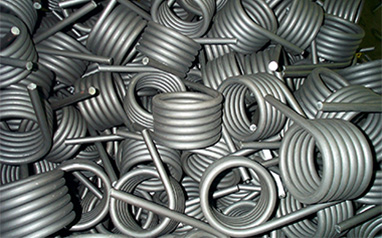Custom Designing Springs
At Mid-West Spring and Stamping, we know the importance of being informed and we always aim to provide our clients with the tools necessary to make important project decisions every step of the way. When it comes to custom designing springs for various applications, there are many factors to consider.
Here are some of the factors that go into choosing the spring material and the varying pros and cons of those elements:
Spring Materials
Just as one would not use a spring from a ballpoint pen in an aerospace application, the end use of a spring factors greatly into its design. Several variables need to be considered, namely the material. Knowing what spring material type to use depends on what function the spring will serve. Springs are expected to have a long and resilient life cycle, with materials able to withstand the normal wear and tear that is expected. Both temperature and corrosion are considered when choosing a spring material.
High Carbon Steel
The most popular material for springs is carbon steel which includes Oil Tempered MB & Music Wire. Carbon Steel properties allow it to offer great hardness levels. High-carbon steel springs can withstand plenty of wear and tear. High carbon steels also come at a lower price and are ideal for most moderately stressed applications.
Chromium Alloys
Chrome Silicon & Chrome Vanadium can withstand higher and lower temperatures than high-carbon steels and are particularly ideal for working conditions including high stress and applications where shock or impact loading occurs. This wire is often used when large-diameter spring wire is required.
Stainless Steel
Another commonly used material in spring manufacturing is stainless steel. Stainless Steel is a cold-drawn general-purpose wire that is both heat and corrosion-resistant. It is offered in different grades, each providing different properties. Some stainless steels can be strongly magnetic, while others have poor electrical conductivity or high tensile strength. Ultimately, stainless steel is a very popular and versatile alloy. Stainless steel is a common and popular choice because of its mid-range price point and ability to cater to a vast array of utility needs.
Nickel
When operating in a high-heat environment or if the application calls for great corrosion resistance, a nickel alloy is guaranteed to sustain its integrity. Nickel alloys offer a high level of strength and durability, even in the most demanding environments. When stainless steel does not provide enough resistance from a harsh environment, cobalt-nickel alloys are the ideal manufacturer choice.
Brass and Phosphor Bronze
Other less commonly used materials include brass and phosphor bronze. Brass is highly water resistant, but its cost is higher and it may tarnish or change color. Phosphor bronze is also not widely chosen for its cost. However, because it is cold drawn, it offers good resistance to corrosion and electrical conductivity.
Whatever your spring application, Mid-West Spring and Stamping can find the right material for the job. As a premier custom springs manufacturer, we craft springs in a variety of types, shapes, and materials to fit your individual specifications. Request a quote to get started on your project today!
Mid-West Spring and Stamping is committed to creating more value for our customers with fewer resources through continuous improvement and the elimination of waste. Join the multitudes of customers that rely on us to optimize the fit, form, and function for their desired outcomes at a competitive cost. Contact us to learn more about custom pieces for your next project.

